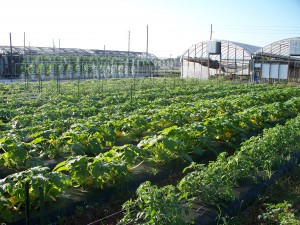Join us for a pre-convergence field trip to Roosevelt Farm. Agriculture instructor Ray Cruze will lead a one hour tour for up to 50 people on Friday, May 2nd from 1-2pm. There is no charge for the tour but you must pre-register since space is limited. Roosevelt Academy was built in the 30’s and they are on the national register of historic places. The student-run farm was started in 1994. Their site is 6 miles away from h.e.a.r.t. off Hwy 27 on the east side of the road, located at 115 E Street. There is a flat grassland in back for parking. Meet at Roosevelt Farm at 1pm or meet at 12:30pm to carpool from the soccer field at h.e.a.r.t.
About the farm: The farm is an actual production farm run by Roosevelt’s agriculture students. Each year students plant and maintain a large variety of vegetables and herbs. Selections include: grape tomatoes, slicing tomatoes, bell and ethnic peppers, onions, bush beans, collards, cucumbers, mustards, squash, zucchini, romaine/bib lettuce, eggplant, cabbage and kale. The program is also known for its production of culinary herbs including: rosemary, lemon thyme, common thyme, dill, basil-purple, lemon, and Italian, cilantro, spearmint, peppermint, parsley, oregano, and tarragon. Students plant over 3.000 onions and 1,600 tomatoes and 2,400 peppers each year. The farm is the largest multi-crop production farm in the city limits of Lake Wales! The produce is sold at the Lake Wales Farmer’s Market, Lake Wales Care Center and used by two local restaurants: The Seasoned Stone and Bok Tower’s Blue Palmetto Café’.
Types of production: Currently there are three forms of crop production technologies used. One is a vertical growing system and the other uses coir (coconut husk) grow-bags. The third method of production uses plastic mulch on raised beds with drip irrigation. All of the irrigation and fertigation is automated to conserve water and nutrients. While not certified organic, no synthetic pesticides, herbicides or fungicides are used on the crops. The farm relies on beneficial insects to control pests, while organic fertilizers and soil supplements like fish emulsion, humic acid and kelp help build productive soils. The soil is cover cropped over the summer with buckwheat to add organic matter and reduce weed growth.
Here are some articles on their project:
http://boktowergardens.org/blog/local-farm-fresh-food-at-the-blue-palmetto-cafe/

